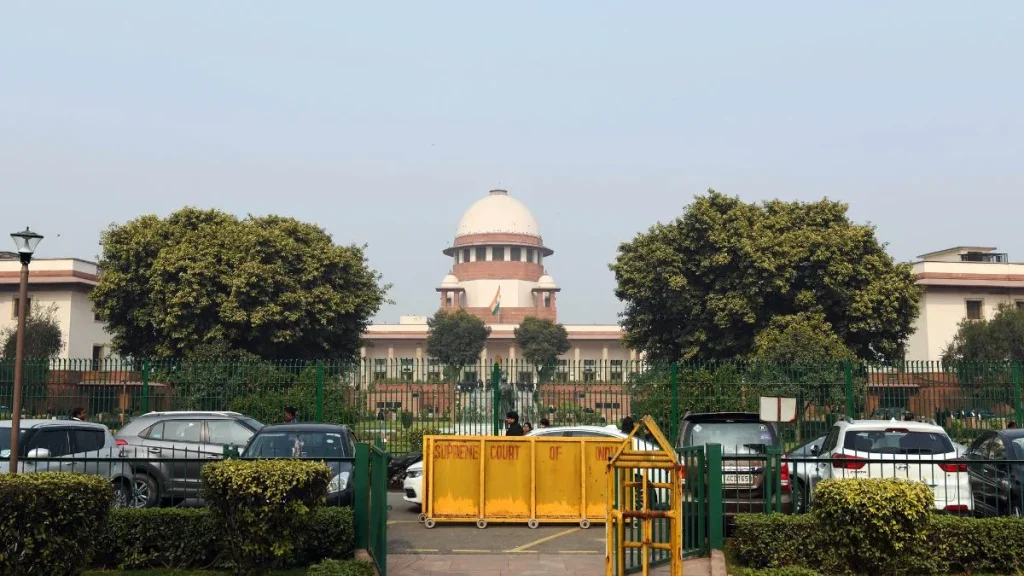Context:
Recently, the Supreme Court (via an order) upheld the inclusion of the words ‘socialist, secular’ in the Preamble of the Constitution.
More on News:
The order (in Dr Balram Singh and Others Versus Union of India and Another Case) was based on the petitions challenging the validity of the inclusion of ‘socialist’ and ‘secular’ in the Preamble via the 42nd Constitution Amendment in 1976.
Several petitioners, including former MP Subramanian Swamy, Dr Balram Singh, and Advocate Ashwini Upadhyay, argued that
- These words that were inserted retrospectively (i.e., the date on which the Constituent Assembly adopted the Constitution on November 26, 1949) amounted to a fraud on the Constitution.
Key Highlights of the Judgement:
The Supreme Court held that:
- The word ‘secular’ denotes a Republic that upholds equal respect for all religions.
- The word ‘Socialist’ represents a Republic dedicated to eliminating all forms of exploitation viz. whether social, political, or economic.
The Supreme Court also clarified that:
- ‘Socialism’ in the Indian context meant the commitment to function as a welfare state.
- “Neither the Constitution nor the Preamble mandates a specific economic policy or structure, whether left or right.
- The ‘socialist’ also advocated for the state’s commitment to be a welfare state and its commitment to ensuring equality of opportunity.
- Since independence, India has consistently embraced a mixed economy model where both the government and private sector were expanded over the years.
- India has developed its Indian Secularism wherein the State neither supports any religion nor penalises the profession and practice of any faith.
- This principle is enshrined in Articles 14, 15, and 16 of the Constitution, which prohibit discrimination against citizens on religious grounds while guaranteeing equal protection of laws and equal opportunity in public employment.
The Parliament had an unquestionable power to amend the Constitution under Article 368. Its power to amend extended to the Preamble.
The court confirmed the retrospective amendment to the Preamble, saying the date of adoption would not curtail the power under Article 368.
The preamble was an inalienable part of the Constitution.
The court said the Preamble’s original tenets of equality of status and opportunity, fraternity, dignity and liberty reflect the secular ethos of the Constitution.
About Preamble:
Amendments to the Preamble:

42nd Amendment Act, 1976: After the verdict of the Kesavananda Bharati Case, it held that the preamble is a part of the Constitution.
- As a part of the Constitution, the preamble can be amended under Article 368, but the basic structure of the preamble cannot be amended.
- As of now, the preamble is amended once via the 42nd Amendment Act, of 1976.
The terms ‘Socialist’, ‘Secular’, and ‘Integrity’ were added to the preamble via the 42nd Amendment Act, 1976.
- ‘Socialist’ and ‘Secular’ were added between ‘Sovereign’ and ‘Democratic’.
- ‘Unity of the Nation’ was changed to ‘Unity and Integrity of the Nation’.
Status of the Preamble
(I) Berubari Case (1960):
- It was under Article 143 (1) of the Constitution to implement the Indo-Pakistan Agreement related to the Berubari Union.
- The Supreme Court said that the Constitution can be interpreted in the light of the noble vision of the preamble but the preamble is not a part of the Constitution and it is a preface of the Constitution, so it cannot be amended as well.
(II) Kesavananda Bharati Case (1973):

- The Supreme Court held that the preamble is a part of the constitution, hence the preamble is amendable subject to the condition that no amendment is done to the basic features.
- The court also opined that the Constitution should be read and interpreted in the light of the grand and noble vision of the preamble.
However, the following things should be kept in mind:
- The preamble is neither a source of power nor a limitation on the power of the legislature.
- It is non-justiciable in nature. It means its provisions are not enforceable in Courts of Law.
(III) LIC of India Case (1995): The Supreme Court has once again held that the Preamble is an integral part of the Constitution but is not directly enforceable in a court of justice in India.

